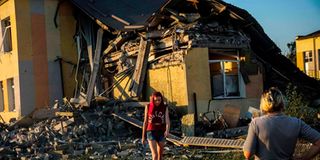Is Russia a genuine ally or hoax to cover up its mess?

Women stand in front of a destroyed school building following a missile strike in Druzhkivka, Donetsk region on August 30, 2022, amid the Russian invasion of Ukraine.
Facing increasing isolation from the West due to its war of aggression on Ukraine, Russia seems to have turned its attention towards Africa in search of new allies and potential support and opportunities for collaboration.
By mid-2023, Russia’s Foreign Affairs Minister Sergei Lavrov had visited 10 African states—Kenya, Burundi, Mozambique, South Africa, Eswatini, Angola, Eritrea, Mali, Mauritania and Sudan—in three different phases. In July 2022, he visited Egypt, Republic of Congo, Uganda and Ethiopia and met with the African Union (AU) leadership in Addis Ababa.
And last year, he attended the BRICS annual leaders’ summit in South Africa. These more than 15 trips to the continent, in just over one and a half years, closely followed Russia’s invasion of Ukraine, which began in February 2022.
With some 1.4 billion people, Africa constitutes about 17.5 per cent of the world’s population. Establishing cordial relations with such a significant portion of the world’s populace could substantially bolster Russia’s political, social and economic standing relative to its current situation and alleviate some of the effects of the sanctions imposed by the West. However, the extent to which Kenya, and Africa as a whole, stand to benefit from this relationship remains uncertain.
Leading up to Lavrov’s visit to Kenya, where he met with President William Ruto, Russia had donated 34,000 tonne of fertiliser a month earlier. During the May 29 meeting with the Head of State and other top officials, Lavrov told the press that the grain shortage fuelling food insecurity in Kenya and other parts of Africa was “geopolitically induced”. He further stated: “We need to guard ourselves against the negative impact of mechanisms created by the West and build independent supply chains.”
Lavrov argued that Moscow’s invasion of Ukraine should not be blamed for the food shortage; rather, the West should be blamed for sanctioning Russia and diverting grain intended for Africa elsewhere. The “special window” he referred to was the Black Sea Grain Initiative, an agreement aimed at removing the blockade by Russia on Ukraine’s grain and allowing Russia’s fertiliser to be transported if intended for hunger alleviation.
Contrary to the disinformation regarding Russia’s role in directly contributing to hunger in Africa, and Kenya in particular, the invasion of Ukraine by Russia is, arguably, one of the most significant contributors to the situation as it instantly reduced grain supply and drove up prices, disrupting a vital part of the global food supply system. Moreover, in under two months of Lavrov’s visit, where he had assured Kenya of help through the Black Sea Grains Initiative, Russia formally terminated the programme.
While Russia has hosted the Russian-African summit, advocated the inclusion of more African countries in the BRICS alliance, and made numerous diplomatic overtures in Africa to show solidarity, many questions remain regarding the true intentions behind these gestures. Is Russia a genuine ally to Kenya and Africa, or is it merely seeking companionship whose sole purpose is to deflect attention from the political and socioeconomic mess it has caused in Ukraine and the wider world?
- Ms Okoth is an advocate of the High Court of Kenya, specialising in environmental rights, climate justice and land rights. [email protected].




